Last month, I shared our new filing cabinet makeover — as well as how I pared down our paper piles from 4 large filing drawers down to 2 much smaller filing drawers (with room to spare!)
It felt SOOO good to purge that extra paper weight (pun intended) and to have all my files neat and organized BEFORE the New Year… and before tax season.
However, after I published that post, I received a massive amount of emails asking for LOTS more details on how exactly we got rid of SO much paper.
The emails asked how we sort, organize, file, and store our papers; what papers we keep, what papers we don’t keep, if we use a scanner, what scanner we use, where we store online documents, etc. etc.
So over the past month, I’ve put a little more thought into how exactly we’ve managed to drastically pare down our paperwork over the past few years — and I’ve tried to condense all that information (it’s a lot!) into one easy-to-digest blog post.
Here we go…
1. We realized there are many papers we do NOT need to keep:
I think a big reason I’ve been able to pare down our paper piles is because I’m learning that it’s actually not necessary to keep many papers these days — digital OR hard copies — because so much of the information is available via the internet with a few clicks.
Here is just a short list of the papers we no longer store, file, scan, or keep in any form.
Manuals:
We rarely ever keep manuals or instructions packets (which can be really bulky) because all we have to do is Google the item (‘KitchenAid Mixer Manual’ or ‘Echo Weed Whipper Manual’) and we have instant access to it right there on our computer screens — or even our phones.
Credit card, bank, investment, retirement, and utility bill statements:
Not only do we not KEEP any of these statements, we don’t even GET them anymore (digital or hard copy). We simply get an email once a month, alerting us that the statements are available online, and then we can log into our account whenever we want/need to view them.
They are always there — and since we have ALL our bills set up for auto-pay, we don’t ever have to worry about bills getting lost or having a late payment.
Receipts:
We don’t keep any receipts — except for large ticket items (like electronics or furniture). I hate shopping — so the majority of what we buy on a monthly basis is gas and groceries; and we don’t keep those receipts.
Also, since we buy everything with our one credit card (and then pay that credit card in full at the end of the month) almost any store computer system can easily look up any potential returns just by swiping our credit card.
Any online shopping we do sends receipts to our email or saves them in our online account (like Amazon.com or ThredUp.com) so I’ll usually keep those emails until the item arrives; then I delete the email.
Extra “filler papers”:
For the papers we DO keep (like insurance paperwork, legal documents, etc.) there are usually several pieces of “filler paper” that is shoved into the envelope too.
For example, our home/auto insurance is 2 pieces of paper — but EVERY SINGLE TIME it gets mailed out to us, it comes with an entire booklet of disclaimers and information about our insurance policy. All of that information is available via the company’s website (and by simply calling an agent) so there is no reason we need to store that big packet of information two times each year!
Anything else we can find digitally:
Ok, so this is kind of broad — but it basically encompasses a mass amount of paper clutter that would otherwise be on our counters, piled on our desk, or taking up way too much space in our filing cabinet drawers.
This category includes things like:
- Paper recipes and hard-copy cookbooks — I have almost NONE of these anymore
- Newspapers — we stopped our print subscription a few months ago and get all our news digitally now
- Magazines or other subscriptions — I get one freebie magazine (Better Homes & Garden) but other than that, we find the information we want online
- Informational packets — we get all sorts of these “packets” from Dave’s school, our church, our city, community events, etc. but we’ve found that often, the information is available on the internet
Anything we can “take action” on immediately:
This is another somewhat simple concept — but it seriously helps to eliminate tons of paper clutter from our home.
Basically, if we get any sort of paper that requires a response (phone call, email, RSVP, signature, etc.) we do that ASAP, write down any necessary information in our planner, and then toss the paperwork.
I talk more about this system here (if you’re interested) but seriously, this saves us so much paper clutter — and it assures that we don’t let little things, dates, events, to-do’s, etc. fall through the cracks.
Most memorabilia:
I almost never print pictures (except for the large ones that hang on the walls) and we rarely ever save cards, letters, memorabilia, etc. — or if we do save it, it’s just for a specific time period and then we purge.
Dave and I are not sentimental, and I’d rather just take a picture of something and put it in our digital photo album versus hanging onto all sorts of sentimental paper clutter that takes up tons of space.
I realize this might not be a super popular opinion — but when it comes to paperwork, Dave and I are basically to the point where if we don’t need it for legal purposes, personal record, or tax purposes, we don’t keep it. Obviously there are a few exceptions — but this is truly our “rule-of-thumb” when deciding if we should or should not keep certain pieces of paperwork.
As far as the paperwork we actually DO keep, you can read about that here. (There’s a free printable to help you organize your important documents, too.)
2. We purge papers ASAP:
Another reason we live a relatively paper-less life is because Dave and I are BOTH really proactive with tossing unneeded papers ASAP. We try not to let lots of unnecessary paperwork even enter our home, we unsubscribe from anything we don’t want, we’re not super sentimental, and we purge paper that does enter our home on a daily and weekly basis.
- If something is junk, we toss or recycle it right away. Period. (Here are some ideas to reduce the amount of junk mail you receive)
- If somethings needs a response, we do it right away and then either toss or file the paperwork.
- If something needs to be filed, we file it right away (because you know it only takes 4 seconds to file a paper) and then we never need to spend hours weeding through huge piles of paperwork to file.
- If it’s something we need to do, we either do it right away, or we make a note of it in our planners and then file/trash the paperwork in the appropriate place.
- If it’s a receipt that needs to be entered into my Finance-Tracking Workbook, I enter it right away (because again, it takes less than a minute) and then toss the receipt.
Are you sensing a theme here?
Doing it “RIGHT AWAY” is key to preventing those overwhelming paper piles — and if you really stop and think about it, most of these actions take mere seconds to accomplish.
As with all new habits, it will take some time to develop this “right away” paper purging mentality (especially if you’re a pile-loving person) but keep at it. It’s such a huge factor in preventing paper clutter and it’s not that difficult to do!! I promise!!
3. We’ve created systems for the papers we do keep:
Obviously, there are some papers we DO need to keep — but I’ve tried to create a system for all of those as well. Since I’ve already written blog posts on many of those systems, I’m simply including the links to those posts below:
Our medical and insurance paperwork
Our passwords (specifically handy since we store lots of information online)
These systems originally took a bit of time and energy to set up, but they have saved me SO much time since then, and they make organizing our paperwork THAT much easier.
4. We don’t scan, but we DO store information digitally:
I’m often asked if I scan tons of of documents into our computer — and surprisingly, my answer is “no”. I actually rarely scan anything and almost never use the scanner feature of our printer. If I do need to scan something, I use the free CamScanner app on my phone — but that’s very rare.
Like I mentioned above, we’ve simply realized that it’s just NOT necessary to keep so many papers these days — so it’s not even worth it for us to scan them.
That said, there is still information we do keep — but we store a lot of it digitally. And when I say we “store it digitally”, I’m mainly referring to photos, recipes, and documents.
Almost all the recipes I use are either right here in my blog’s recipe box or in a virtual recipe box via AllRecipes.com. We keep ALL our photos on the iCloud photo stream and then also on Flickr. We use Dropbox to store any computerized documents (Word, Excel, PowerPoint, PDF’s, etc.) and we also back everything up on a portable hard drive that we keep in our fireproof safe.
I realize this system won’t work for everyone — but it works REALLY well for us right now — and has for the past few years. I don’t ever anticipate being fully paperless (that’s not even one of my goals) but I have enjoyed continually transitioning to a less paper-filled home — and yes, it IS a continual process!
It has taken diligent work to evaluate our paper needs, set up systems that work with our needs, tweak those systems as necessary, and then practice daily, weekly, monthly, and yearly maintenance to keep the systems working as necessary — but it’s TOTALLY worth it!
We almost never misplace paperwork, we can find the papers we need within seconds, and (best of all) our counters and other flat surfaces are free from piles of paper clutter!

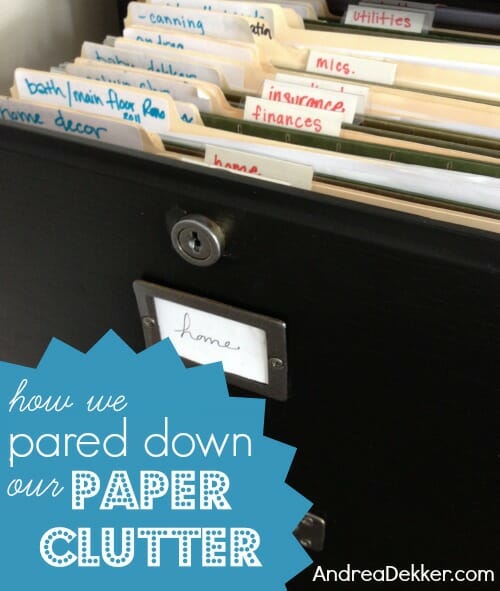
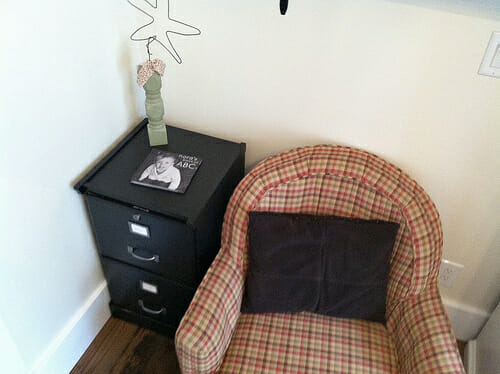
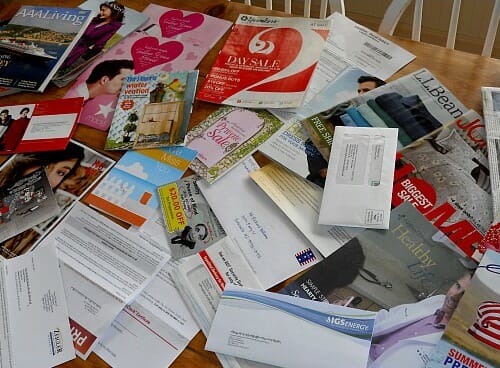
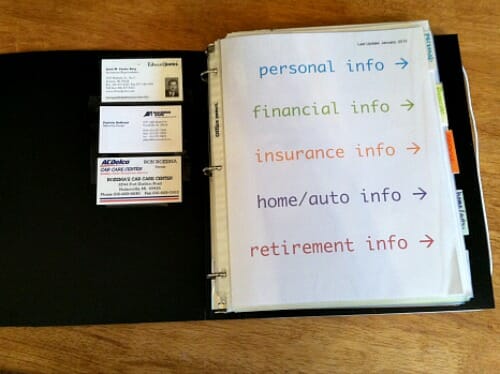
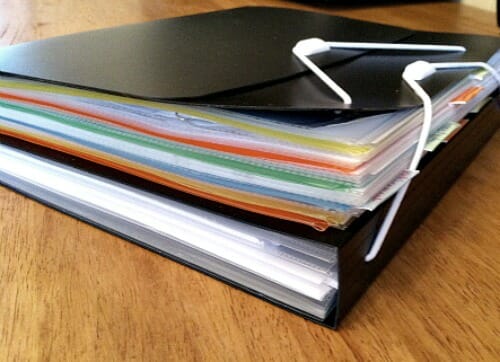
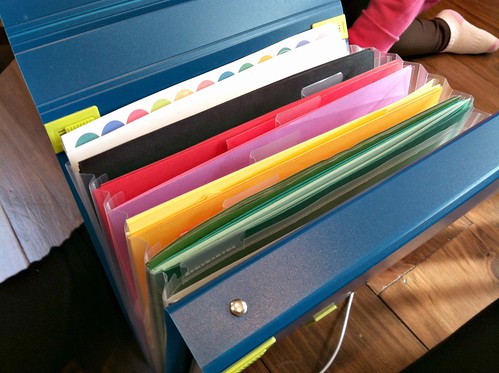
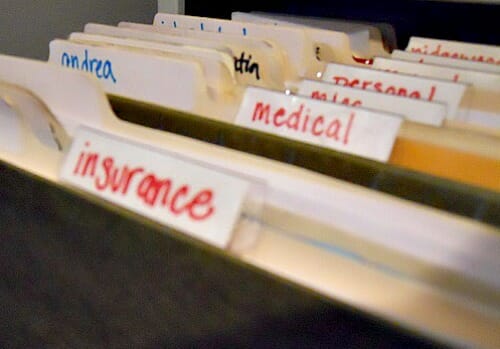
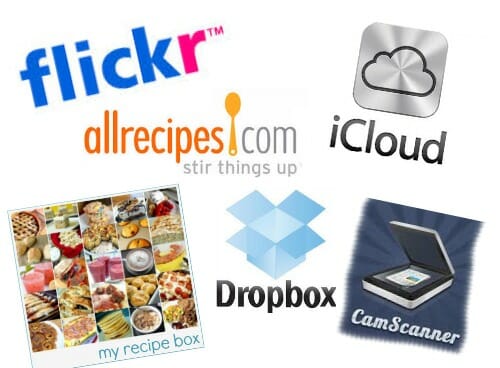
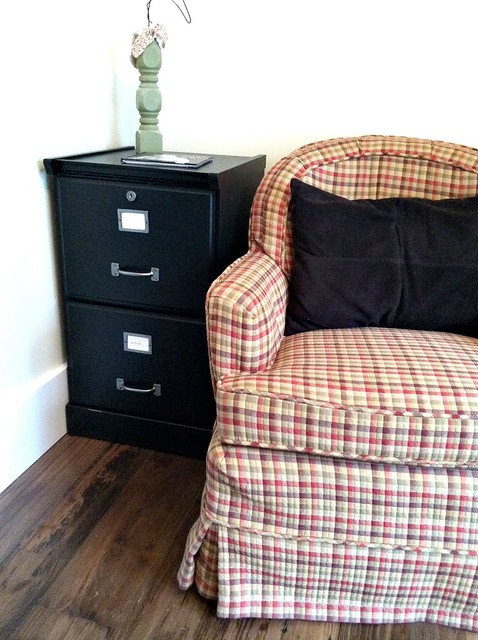
T says
Man, do I love you. So much organizing stuff makes life so complicated! This file, this pile, this system, etc. etc. When really, get rid of it and deal with stuff right away makes life so much simpler and easier all around. LOVE it and your minimalist approach (I still think you are kind of a minimalist, but I think it’s awesome!)
T
Debbie says
We keep all our receipts and when I get the email that our credit card or bank statements are ready to be viewed I match the receipts with what’s on the statements. Since we live in Washington state we have no income tax and therefore can write off sales tax if you itemize. All the receipts that’s been matched to the statements that has sales tax then goes to a folder and used to prepare our tax return. If I don’t keep these receipts we can only deduct an amount based on an IRS table, which if you’re doing renovations and more purchase than a normal household would be a lot less that you can actually write off.
Keeping on top of it is definitely a must. I file things, record, or throw it away almost daily.
Katie says
This is glorious! Just what I needed to get inspired to purge a lot of extra paperwork. I feel a project coming on this afternoon… 🙂 Thanks for the info and the printables. Super cool!
Tammy Skipper (@Tammy_Skipper) says
Oh no…the answer is ‘do it right away’ LOL! Seriously, I was so on top of this stuff before I started working full time. I am determined to purge by this summer though. I’m seriously considering taking all the existing paperwork out and putting it into cardboard boxes til I purge/shred/recycle everything I can then only put back what will fit in my two drawers (one personal, one business). This seems an easier way to catch up than slowly going through the files one at a time directly from my drawers.
Nicole says
the bane of my paper existence is all of the school stuff. Art projects, worksheets, all stuff that’s really super adorable (or that SHE is really attached to). I can’t keep it all, but some of it is really hard to get rid of.
Patti says
Nicole, my son is grown now, but when he started through school, I bought sturdy (think Rubbermaid brand) plastic 9″ X 13″ food storage containers with lids–one for each grade, pre-k through junior high. (We got a REALLY big container for his senior year. lol!) I bought all the containers at once so that they stacked together and stored easily on the top shelf in his closet. As each school year progressed and he brought art and school work home and wanted to save it, we would put it in that year’s container. When the container got full, he had to choose what he really wanted to save because the rule was that each year had to fit into one container. He still has all his school work, yearbooks, etc and it’s preserved nicely. He’s (still) very sentimental and loves going through it and showing it to his kids. Maybe considered clutter by some and not a system for everyone, but we love it and we all get a kick out of it. 😀
Andrea says
this is a great idea Patti! Thanks so much for sharing!
I’m not sure it would be quite as doable for a family with several children but definitely super organized and it sounds like the perfect system for your son!
Lizanne says
As usual, I am inspired by and impressed with your simple, yet thorough, methods of dealing with all this paper! I have been trying over the past few years to minimize my paper clutter as well – unsubscribing, automating, digitizing, etc.–but still it finds its way in. I began to adopt your filing cabinet system, and I think January is the time for me to finish implementing it, along with some of the changes you have here. Showing how you do it is so helpful. Thanks!
Molly Ekkens says
This post was so helpful! We are in the process of packing for a big move and the last thing I want to do is haul a bunch of useless paper around! Perfect timing!
Mrs. W says
Perfect day for some great paper decluttering inspiration! We are home all day because of the cold and now I am decluttering our paper files.
Leanne says
I took the opportunity of being stuck indoors because of a snow emergency to reorganize my files and order myself a couple of duo binders. Those I’ll use to make a home binder. I threw out 2 bags of paper clutter! thanks for the great ideas!
Julie Spady says
Thank you! That was a long and very helpful post!